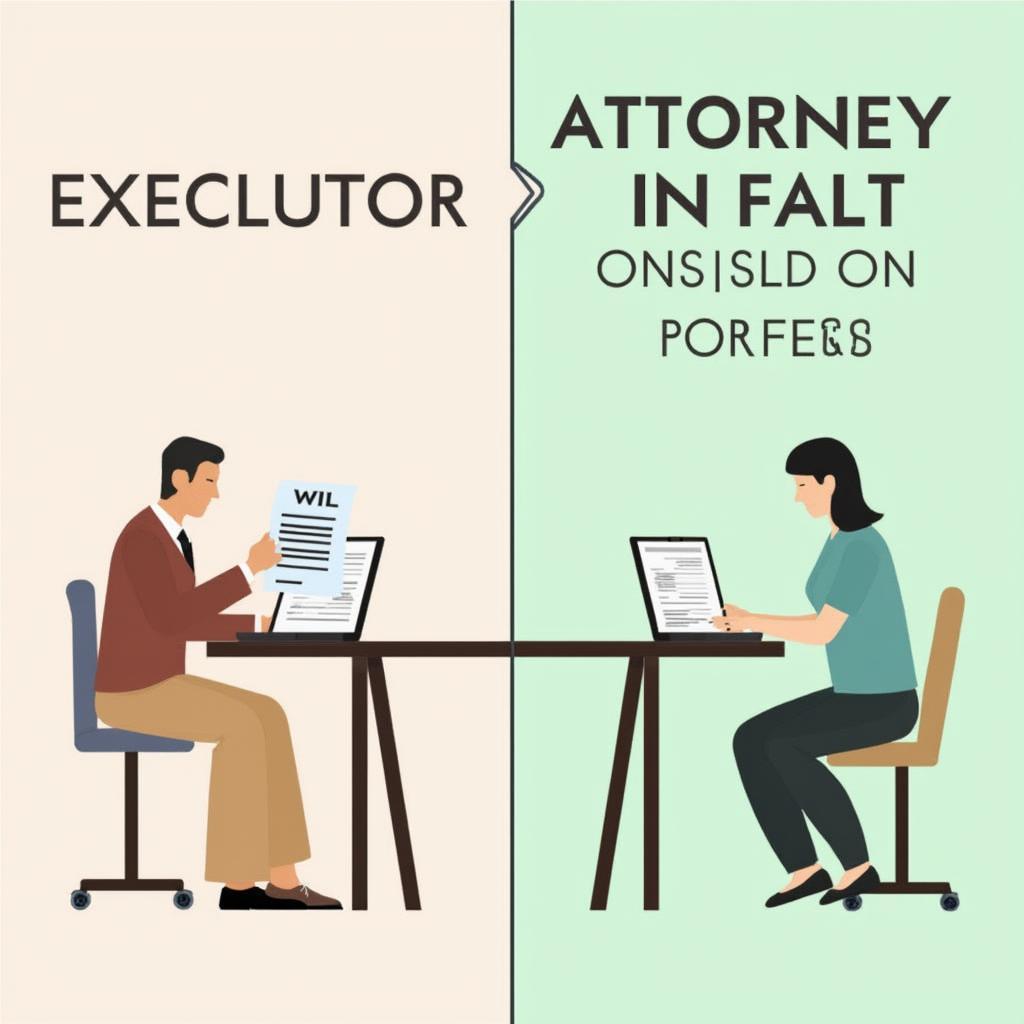
Does an Executor Have Power of Attorney?
An executor and someone with power of attorney both manage another person’s affairs, but their roles, powers, and when those powers take effect are different. Understanding the distinction between these two roles is crucial for estate planning and managing someone’s assets. This article clarifies the difference between an executor and someone holding power of attorney, addressing the common question: does an executor have power of attorney?
Executor vs. Power of Attorney: Key Differences
The simple answer is no, an executor does not automatically have power of attorney. These are distinct legal roles with different scopes of authority. An executor is named in a will and their authority begins after the testator’s death. They are responsible for administering the deceased’s estate according to the will’s instructions. This includes paying debts, distributing assets to beneficiaries, and filing necessary legal documents with the probate court.
A power of attorney, on the other hand, grants authority to an agent (also called an attorney-in-fact) to act on behalf of a living person (the principal). This authority can be broad or limited, depending on the specific powers granted in the document. A power of attorney can be effective immediately or upon the occurrence of a specific event, such as the principal’s incapacitation, and terminates upon the principal’s death.
 Executor vs. Power of Attorney: Key Differences Explained
Executor vs. Power of Attorney: Key Differences Explained
When Does an Executor’s Authority Begin?
An executor’s authority begins only after the testator’s death and after the will is admitted to probate. Before the will is probated, the executor has no legal standing to act on behalf of the estate. The probate process validates the will and officially appoints the executor.
Different Types of Power of Attorney
There are various types of power of attorney, including:
- Durable Power of Attorney: This type remains effective even if the principal becomes incapacitated.
- Non-Durable Power of Attorney: This type terminates if the principal becomes incapacitated.
- Special Power of Attorney: This grants authority for a specific purpose or limited time period.
- Medical Power of Attorney (or Healthcare Proxy): This allows an agent to make healthcare decisions for the principal.
 Different Types of Power of Attorney and Their Uses
Different Types of Power of Attorney and Their Uses
Can Someone Be Both an Executor and Hold Power of Attorney?
Yes, a person can be named both an executor in a will and hold power of attorney for the same individual. However, these roles remain separate and distinct. While the principal is alive, the individual acts under the power of attorney. Upon the principal’s death, their power of attorney ceases, and they then assume the role of executor, managing the deceased’s estate.
“It’s not uncommon to see individuals named as both executor and holding power of attorney, especially in family situations. This often streamlines the estate administration process,” says Nguyen Thi Lan, a seasoned estate planning attorney at a reputable Ho Chi Minh City law firm.
Why Understanding the Difference is Crucial
Confusing these roles can lead to legal complications. For example, attempting to act as an executor before the testator’s death is invalid and can have serious consequences. Similarly, using a power of attorney after the principal’s death is also legally ineffective.
“Understanding the differences between these roles is fundamental for both estate planning and managing someone’s affairs. It ensures that actions are taken legally and according to the principal’s or testator’s wishes,” advises Tran Van Tuan, a probate lawyer practicing in Hanoi.
Conclusion
While both an executor and someone with power of attorney are entrusted with managing another person’s affairs, their roles and powers are distinct. An executor administers a deceased person’s estate according to their will, while a power of attorney allows an agent to act on behalf of a living person. Understanding the difference between an executor and someone holding power of attorney is crucial for avoiding legal issues and ensuring a smooth transition of assets. If you have questions about estate planning, consult with a qualified legal professional.
FAQ
-
Does an executor override a power of attorney? A power of attorney terminates upon the principal’s death. The executor’s authority then begins after the will is probated.
-
Can an executor change a power of attorney? No, an executor cannot change a power of attorney. The power of attorney document itself may outline provisions for revocation or amendment, usually by the principal.
-
Who appoints an executor? The testator names the executor in their will.
-
Who appoints someone with power of attorney? The principal grants power of attorney to their chosen agent through a legal document.
-
What happens if someone acts outside the scope of their power of attorney? Acting beyond the granted powers is a breach of fiduciary duty and can have legal repercussions.
-
How do I choose an executor? Choose someone you trust who is responsible and capable of handling the complex tasks involved in estate administration.
-
How do I choose someone to grant power of attorney? Choose someone you trust implicitly to act in your best interests, and clearly define the scope of their authority.
“Choosing the right individuals for these crucial roles requires careful consideration and open communication. Seeking professional legal advice can help ensure your wishes are respected and your assets are managed responsibly,” advises Pham Thi Hoa, an experienced estate planning attorney based in Da Nang.





